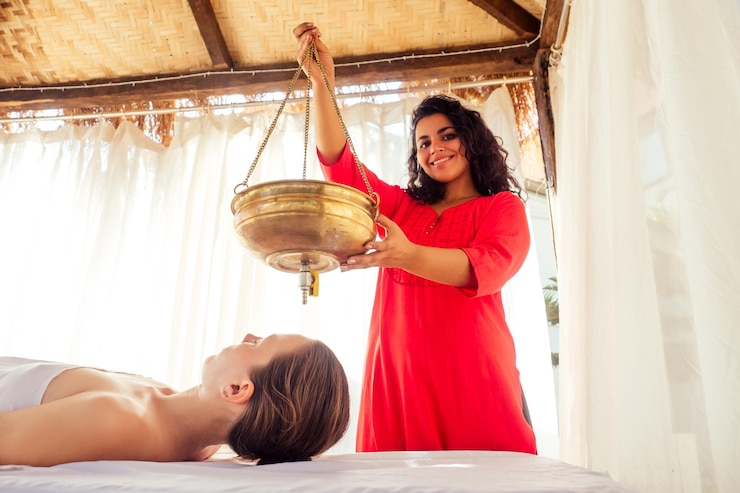Panchakarma: Stress Relief Unveiled

Key Takeaways
- Panchakarma offers a holistic approach to stress relief, rooted in Ayurvedic medicine, making it a popular natural remedy for managing stress.
- The detox therapy in Panchakarma involves a cleansing process that plays a crucial role in reducing stress and enhancing overall well-being.
- A Panchakarma session includes several steps, from preparation to various treatments, providing a comprehensive approach to stress relief.
- Stress cleansing techniques in Ayurveda are integral to Panchakarma, helping to clear both the mind and body of stress for improved relaxation and mental clarity.
- Panchakarma can be beneficial for those seeking natural stress relief, with considerations for individual suitability and potential concerns.
Feeling overwhelmed by stress? Many of us are searching for ways to find peace and balance in our lives. Panchakarma, a traditional Ayurvedic treatment, offers a natural way to alleviate stress and promote well-being. This ancient practice focuses on detoxifying the body and calming the mind, making it an appealing option for stress relief.
In this article, we'll explore how Panchakarma stress treatment in Ayurveda can help you find calm in today's hectic world. You'll learn about the detox therapy Ayurveda offers, how it cleanses the body, and why it's considered a powerful tool for stress cleansing Ayurveda. By the end, you'll have a better understanding of why so many people are turning to this holistic approach for stress relief. Whether you're new to Ayurveda or simply curious, this guide will offer insights into how Panchakarma might be the stress solution you've been looking for.

Don't wait or self medicate. Start chat with Doctor NOW
How Does Detox Therapy Work?
Detox therapy in Ayurveda is like giving your body a fresh start. It's a process that helps remove toxins, or "ama," as they call it in Ayurveda. Think of it as spring cleaning for your system. By doing this, it aims to restore balance and improve health.
The treatment often involves a blend of herbal medicines, dietary changes, and sometimes even fasting. It's tailored to each person's needs, focusing on their unique body type or "dosha." This personalized approach makes it more effective and precise.
One key aspect is the use of therapies like massages with herbal oils, which help to loosen toxins. Then, through different methods like sweating or purging, these toxins are flushed out. It's not just about the physical cleanse; it also aims to relax the mind and reduce stress.
A famous Ayurvedic practitioner, Dr. Vasant Lad, once said,
"The body is a vehicle for consciousness, and good health is the means to fulfill the purpose of life."
- Dr. Vasant Lad
This approach helps not just in detoxifying the body but also in calming the mind. Detox therapy is a holistic journey toward well-being, emphasizing the importance of both body and mind in achieving stress relief. By following these practices, individuals can experience a renewed sense of energy and clarity.
Steps in Panchakarma Treatment
Panchakarma, a renowned stress treatment in Ayurveda, involves a series of steps aimed at detoxifying and rejuvenating the body. The process begins with Purva Karma, which prepares the body through methods like oil massages and herbal steam baths. These initial steps help loosen toxins, making them easier to eliminate.
The main phase, Pradhana Karma, includes procedures such as Vamana (therapeutic vomiting) and Virechana (purgation), which actively cleanse the body. This stage is tailored to the individual's health needs and aims to restore balance.
Finally, Paschat Karma involves post-treatment care to ensure long-term benefits. This includes diet and lifestyle adjustments to maintain stress relief and overall well-being. As noted by Dr. Deepak Chopra, "Panchakarma is the ultimate mind-body healing experience for detoxifying the body, strengthening the immune system, and restoring balance and well-being."
Panchakarma isn't just a treatment; it's a holistic approach to wellness that addresses the root causes of stress and imbalance.

The Role of Stress Cleansing
Stress cleansing in Ayurveda is a cornerstone of Panchakarma therapy. This ancient practice aims to flush out toxins and stressors from the body, providing a holistic reset. Imagine your body as a home that collects dust and clutter over time. Regular cleaning keeps it neat and livable. Similarly, stress cleansing removes the buildup of stress and toxins, leaving you feeling refreshed and balanced.
A fascinating statistic reveals that more than 70% of adults experience stress or anxiety daily, according to the American Institute of Stress. Such high levels of stress can lead to various health issues, including heart disease and depression. This makes stress cleansing not just a luxury, but a necessity for maintaining overall health.
In Ayurveda, stress is considered an imbalance in the body's energy. Stress cleansing helps restore equilibrium by using natural methods like herbal oils, massages, and specific diets. These therapies calm the mind and detoxify the body, promoting relaxation and clarity. Think of it as hitting the reset button on your mental and physical health.
The process often begins with a gentle detox therapy in Ayurveda, which includes dietary changes and herbal supplements. These help prepare the body for deeper cleansing. The next steps might involve more intensive treatments, like massages and steam baths, targeting specific stress points.
Imagine you’re untangling a knot in a necklace. Each step of the treatment carefully works to unravel stress, leaving you feeling lighter and more at ease. Stress cleansing Ayurveda is not just about removing stress; it’s about fostering resilience. By addressing the root causes of stress, this approach empowers you to handle life's challenges with grace and calmness.
Is Panchakarma Right for You?
Panchakarma stress treatment in Ayurveda could be the solution you've been searching for if stress has been a constant companion in your life. This ancient practice offers a holistic approach to detox therapy Ayurveda, aiming to cleanse both mind and body. The process of stress cleansing Ayurveda might seem daunting, but it holds the promise of revitalization and renewal.
Before diving into Panchakarma, it's important to reflect on your personal health needs. Are you looking for a natural way to reduce stress, or do you want to explore alternative health treatments? This is not a one-size-fits-all solution, but for those ready to embrace a new path, it might be the perfect fit.
Embarking on a Panchakarma journey can be transformative, but it's crucial to consult with a qualified Ayurveda practitioner. They can guide you through the process, ensuring it aligns with your health goals and personal conditions. This individualized approach is what makes Panchakarma a unique experience.
If this article piqued your interest, why not take the next step? Share your thoughts in the comments or spread the word by sharing this article. You might also want to check out related content to deepen your understanding of Ayurveda and its benefits. Your journey to stress relief could start right here, right now.
FAQ For Panchakarma
What is Panchakarma and why is it effective for stress relief?
Panchakarma is a traditional Ayurvedic therapy focused on detoxification and rejuvenation. It is effective for stress relief because it addresses the root causes of stress through a holistic approach, balancing the mind, body, and spirit.
How does Panchakarma detox therapy work?
Panchakarma detox therapy involves a series of treatments that cleanse the body of toxins. This process includes dietary changes, massages, herbal treatments, and other therapies designed to restore balance and reduce stress.
What are the steps involved in Panchakarma treatment?
Panchakarma treatment typically involves five main steps: preparatory procedures (Purva Karma), primary cleansing methods (Pradhana Karma), rejuvenation (Rasayana), dietary adjustments, and lifestyle modifications. Each step is tailored to the individual's needs.
How does stress cleansing in Panchakarma promote relaxation?
Stress cleansing in Panchakarma uses techniques such as Abhyanga (oil massage) and Shirodhara (pouring warm oil on the forehead) to calm the nervous system. These methods help release physical and mental tension, promoting deep relaxation and mental clarity.
Who can benefit from Panchakarma?
Panchakarma is suitable for individuals experiencing stress, fatigue, or imbalance due to lifestyle factors. However, it is advised to consult with an Ayurvedic practitioner to determine if this therapy is appropriate for your specific health conditions and needs.
What should I expect during a Panchakarma session?
During a Panchakarma session, you can expect a personalized approach tailored to your constitution and health concerns. The session may include massages, steam baths, herbal remedies, and dietary guidelines, all aimed at detoxifying and rejuvenating your body.
How long does a Panchakarma treatment typically last?
The duration of Panchakarma treatment varies depending on individual needs and the specific therapy plan. It can range from a few days to several weeks, with the average program lasting around 7 to 21 days for optimal results.
Got any more questions?
Ask Ayurvedic doctor a question and get a consultation online on the problem of your concern in a free or paid mode.
More than 2,000 experienced doctors work and wait for your questions on our site and help users to solve their health problems every day.

